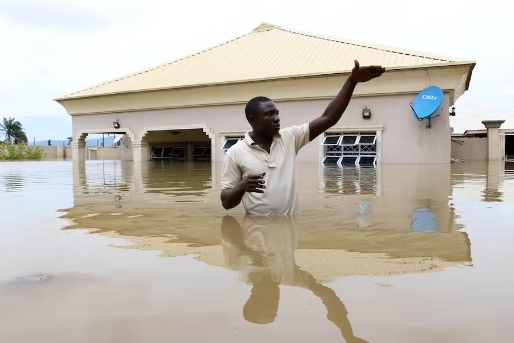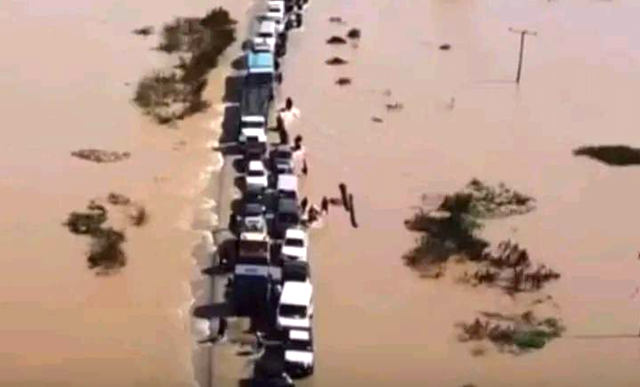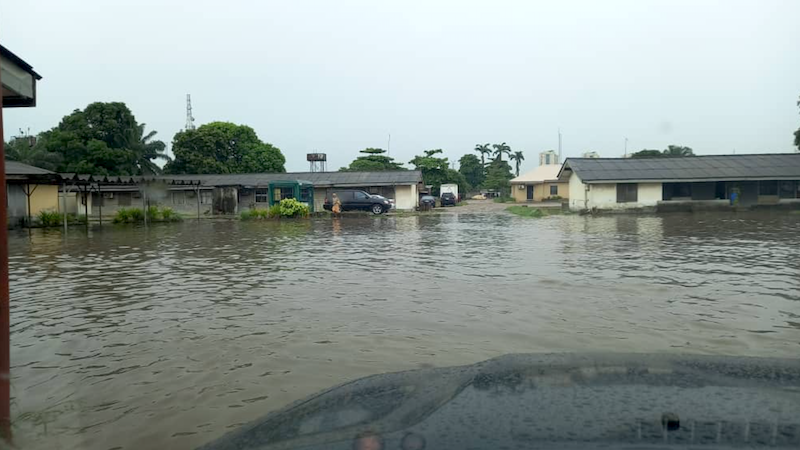Last week, The National Emergency Management Agency (NEMA) issued an alert warning of the high probability of 14 states experiencing heavy rainfall that might lead to flooding. This is not the first time NEMA and Nigerian Hydrological Services Agency (NHSA), through its Annual Flood Outlook (AFO), will issue such alerts, but we keep losing lives and properties to flooding despite early warnings. Our approach and response to such signals have remained reactive. The same last week, the Nigeria Centre for Disease Control and Prevention (NCDC) announced an outbreak of diphtheria in the Federal Capital Territory (FCT). NCDC further informed us that there have been multiple disease outbreaks, including diphtheria, since December 2022, with 33 LGAs in eight states affected. Meanwhile, diphtheria is a vaccine-preventable disease, but our leaders and institutions would prefer to be reactive.
The problem is not peculiar to NEMA, NHSA, NCDC, the affected states or the likely victims. There is a systemic challenge of our institutions and leaders preferring reactive instead of proactive responses to socio-economic challenges. This is from the highest level of government to the least of our public institutions. We are permanently reactive in our approach to governance, suffering devastating consequences before belatedly putting on our thinking caps.
Reactive governance refers to a mode of governance that primarily responds to immediate and pressing issues that arise without sufficient long-term planning or proactive measures. This anomaly is the predominant habit of governance in our country. We tend to sit and wait for foreseeable disasters to consume us before responding. Most of what we treat as emergencies do not qualify. They are avoidable incidents that should not catch any responsible government by surprise.
The source of our reactive approach is a tradition of governance. We emphasise ‘acting’ over and above ‘thinking’ through problems on a long-term basis. Issues like flood disaster prediction, epidemic prevention, speculative vaccine production, and power outage prevention are all ways of avoiding disasters that are sure to occur.
This reactive approach to socio-economic challenges falls within the “reactive state “concept. Two essential characteristics of the reactive state are: first, institutions fail to undertake initiatives to prevent the occurrence of an undesirable event though it has the power and incentive to do so; second, such institutions respond to pressure for change in an erratic and unsystematic manner.
In Nigeria, this reactive state approach naturally flows because it benefits operatives of the system, and our urgency index is high. Manifestations of this reactive state can be seen in our policy approaches to Boko Haram, banditry, kidnapping, oil theft in the Niger Delta and other security incidents.
Further instances demonstrate these cultural-cum-historical reactive approaches to national problems than a proactive and systematic long-term approach seen in the most developed worlds. Nigeria has faced various security challenges, including terrorism, insurgency, and communal clashes. In some instances, the government’s response has been primarily reactive, with the deployment of security forces after attacks have occurred rather than proactively addressing the root causes of these issues through intelligence gathering, preventive measures, and community engagement.
Nigeria’s infrastructure, including roads, power supply, and public transportation, has been a subject of concern for many years. Often, the government has taken a reactive approach to address these deficiencies by initiating projects and repairs in response to public outcry or when critical failures occur rather than proactively investing in infrastructure development and maintenance.
Nigeria’s economy has traditionally been heavily reliant on oil exports, making it susceptible to fluctuations in global oil prices. Reactive governance is evident in the government’s response to oil price shocks, which often involves scrambling to adjust the budget, implement austerity measures, or seek external loans to address revenue shortfalls instead of proactively diversifying the economy and reducing dependence on oil.
Besides, Nigeria faces challenges in its education sector, including inadequate infrastructure, outdated curricula, and low educational outcomes. The government’s approach has often been reactive, responding to issues as they arise rather than proactively investing in education reforms, teacher training, curriculum development, and infrastructure improvements to ensure quality education for all.
Corruption has been a persistent issue in Nigeria, affecting various sectors and hindering development. Reactive governance is evident in the government’s response to corruption scandals, which often involves investigations, prosecutions, and public outcry after the fact, rather than implementing proactive measures to prevent corruption, strengthen anti-corruption institutions, and promote transparency and accountability.
In the developed world, there is a great emphasis on thought in governance. This is why Washington is full of think tanks whose only business is to think through and develop long-term solutions to possible national problems. Government Ministries, Departments and Agencies (MDAs) sometimes collaborate actively with universities and research institutes to work out long-term solutions in anticipation. In most of Europe and Asia, government departments have research departments staffed by some of the best brains trained to conduct anticipatory research and study different problems in relevant areas.
The best approach has proven to be leaders and institutions that adopt proactive decision-making. It is cheaper to be proactive than to be reactive. Being proactive saves lives. By its futuristic estimation, China knows that Africa is the future market; hence, it invests heavily in teaching Africans the Chinese language.
Being reactive often comes with disastrous consequences. One significant adverse result of reactive governance is the populace’s permanent sense of uncertainty. People are unsure that what may come next will not consume them. A sense of collective vulnerability weakens people’s trust in government. People are left with a sense of self-help, of everyone to themselves. In cases of natural disaster, recourse to superstition becomes the only and last resort. People must choose between trust in government and belief in divine salvation. Prophesies of doom acquire legitimacy and find a ready market.
When governance is not informed by rational and scientific projection, the future becomes a dark zone of uncertainty and the abode of the unknown. Fear and cynicism take hold of the hearts of citizens.
A major reason why we are so reactive is that we need to have respect for science and data. Data-driven policies enable policymakers to identify trends, anticipate problems, and develop targeted interventions before they escalate into crises. Nigeria must prioritise sustainable development practices that balance economic growth with environmental and social considerations. This includes promoting renewable energy, implementing sound environmental policies, and adopting responsible resource management practices. A proactive approach to sustainability can help mitigate environmental degradation, address climate change challenges, and promote social equity.
To move beyond reactive governance in Nigeria, adopting a proactive approach that focuses on long-term planning, anticipates challenges, and promotes sustainable development is important. Some key areas that could contribute to this shift are detailed below.
The Nigerian government should emphasise the formulation and implementation of long-term strategic plans. This involves setting clear goals, identifying potential risks and opportunities, and developing strategies to address them. Strategic planning enables proactive decision-making and reduces the need for reactive measures.
It is crucial to strengthen the institutions responsible for governance in Nigeria, including the judiciary, legislature, and civil service. This involves enhancing their human and institutional capacity, improving transparency and accountability, and reducing political interference. Strong institutions are better equipped to anticipate and address issues before crises occur.
In addition, active citizen participation is vital for effective governance. Governments should promote transparency, engage citizens in decision-making processes, and establish mechanisms for feedback and accountability. This helps identify problems early on, encourages citizen ownership, and fosters a sense of responsibility among the populace.
Furthermore, proactive governance relies on accurate and timely information. Governments should invest in data collection, analysis, and utilisation to inform decision-making processes. Departments of Research and Planning cannot be a dumping ground or a place of punishment for public servants that have fallen out of favour. It should rather be the hub of policymaking and designing solutions to challenges. Let the best brains man this critical department. We should collaborate with our research institutions where there are obvious capacity gaps.
Our leaders and managers of institutions always want to profit from disasters. Even at the policy level, the equation often favours a reactive than a proactive approach. With newly elected officials at all levels, we need to switch from reactive to proactive ways of dealing with issues of national and global importance.
It is important to note that while these examples used above highlight instances of reactive governance, they do not encompass the entirety of governance in Nigeria. Nigeria has also witnessed proactive initiatives and policies in various areas, but there is room for further improvement in adopting a proactive approach to governance to address long-term challenges effectively.
Moving beyond reactive governance in Nigeria requires a shift in mindset, focusing on critical thinking over “doing”, long-term planning, and strengthening institutions and citizen engagement. By adopting a proactive approach, Nigeria can better anticipate and address challenges, promote sustainable development, and improve the well-being of its citizens.
This new administration is poised to do great things, and its starting point should be to prioritise the shift from the dominant leadership mentality of reactive governance to a proactive one. The administration must be intentional and proactive in solving Nigeria’s myriads of problems and rely on evidence and scientific approaches than the traditional path dependency that has characterised our governance in the past.
The lack of ability to solve major issues in Nigeria is not often because of a lack of resources but because of a lack of proactively planning and adopting creative and innovative solutions. Our leaders must adopt new approaches to doing things if they must succeed. Remember that you cannot do the same thing and expect a different result. Input determines output – garbage in, garbage out is the computer language. That is true about input and output in problem-solving.









